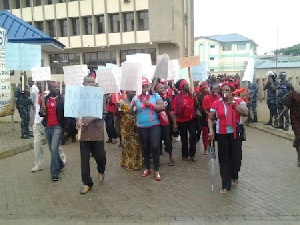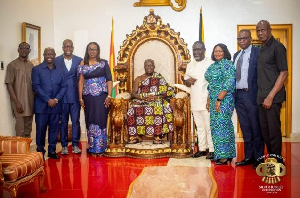- Home - News
- TWI News | TV
- Polls
- Year In Review
- News Archive
- Crime & Punishment
- Politics
- Regional
- Editorial
- Health
- Ghanaians Abroad
- Tabloid
- Africa
- Religion
- Election 2020
- Coronavirus
- News Videos | TV
- Photo Archives
- News Headlines
- Press Release
General News of Monday, 1 December 2014
Source: BFT
Be wary of workers’ wrath – EIU advises government
The Economist Intelligence Unit (EIU) is warning that government's determination to hold down the wage bill will create a surge in the frequency of industrial actions such as strikes.
Finance Minister Seth Terkper, reading the 2015 budget and economic policy, warned workers that wage negotiations will be done within the budgetary constraints to ensure sustainability of the Single Spine.
Wage expenditure has contributed to Ghana's large fiscal deficit in recent years, and 2014's projection of GH?11.1 billion will account for 9.7 percent of GDP.
As part of measures to realise its 2015 budget deficit target of 6.5 percent of GDP, government hoping to stem the typical wage expenditure overrun - a major cause of the deficit figures recorded.
But government's obstinate posture in the wage negotiations, according to Philip Walker, EIU's Regional Editor, is likely to spark a wave of industrial unrests over disagreement in wage adjustment levels.
Government was hoping to complete negotiations for 2015 wages before presenting this year's budget to Parliament, but the negotiations stalled. The expiry of the Cost of Living Allowance (COLA) at year-end has added to wage pressures with workers looking forward to reclaiming some of their lost purchasing power in 2014.
In an emailed response to the B&FT, Mr. Walker said: "Government cannot really afford to back down if it wants to secure the IMF assistance and financing from other donors. The wage bill has to be tamed. We predict this will result in increasing frequency of labour unrest, such as strikes".
According to the EIU the general direction of the budget, toward heightened austerity measures taken on the basis of scaled-back growth forecasts, is likely to hold.
"If anything it will be intensified as elements that are still vague - particularly on the spending side - are clarified while the IMF deal is concluded and the 2014 actual performance data are tallied and compared with Mr. Terkper's estimates," he added.
Government's decision to boost revenues by way of tax increases, in addition to expensive and unreliable utilities, is likely to hit businesses hard.
The pain, Mr. Walker said, "will be in the short-term, but the longer-term goal of stabilising the fiscal position and ensuring more robust levels of growth will benefit businesses".
Sampson Akligoh, an economist and Managing Director of InvestCorp, commenting on businesses' performance in the coming year said "government must work hard to improve power and water generation and distribution, and give better forward guidance to businesses about petroleum price adjustments”.
This he said will ensure that revenue collection keeps pace with outlays in the budget as a shortfall in 2015 will significantly worsen Ghana's fiscal space.
Also, the EIU believes that the budget as well as the economic performance next year depends on factors that remain fluid, forcing the government into a reactive mode and diminishing the credibility of any forecast it issues.
"The IMF negotiation once complete will clarify the picture, as will any progress on the energy front, with the first deliveries of offshore natural gas due to the newly-built plant at Atuabo and onward to the Volta River Authority for power generation. If power generation can be ramped up quickly, it will address perhaps the most important bottleneck in the industrial economy."











